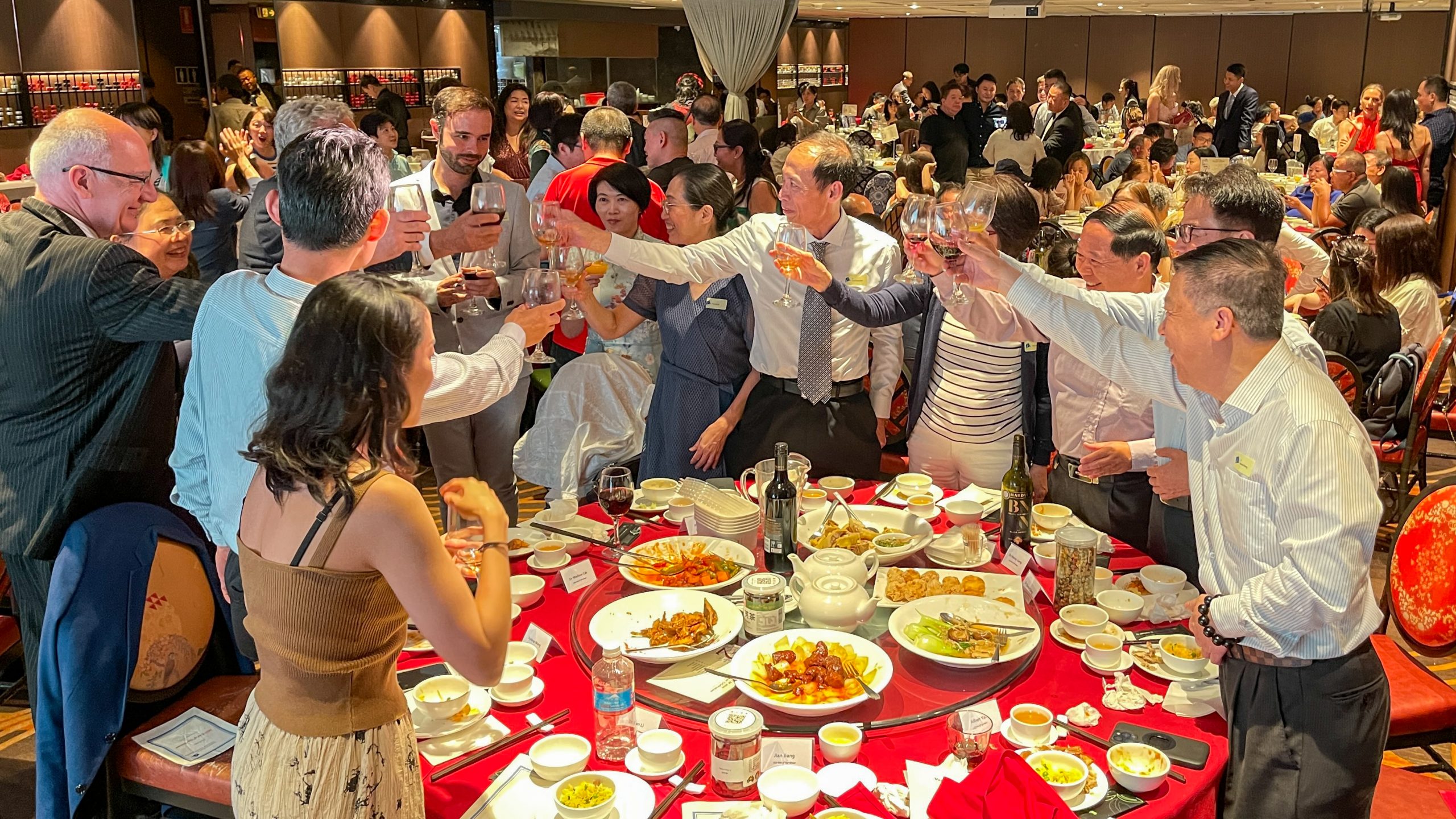Menu
- SITCM Overview
- Prospective Students
- Current Students
- Alumni
- Teaching Clinic
The annual SITCM End-of-Year Dinner took place on 3 December 2023, with over 200 members of the traditional Chinese medicine (TCM) community in attendance. Mixed among the lively performances, raffle draws and academic awards were various speeches relating to Chinese medicine education. The speakers each had a valuable message to share with the TCM community; here’s a summary of what they said.
OUR COMMITMENT TO CHINESE MEDICINE
By Damien Mathews, CEO
SITCM’s CEO, Damien Mathews, began by acknowledging recent changes in Australia’s TCM education market, with UTS discontinuing its Chinese medicine program and RMIT announcing similar plans. Uniquely among Australia’s accredited higher education providers, SITCM is owned by TCM practitioners and has an unwavering commitment to the sector.
Damien went on to note the unrealised potential of Chinese medicine in Australia, whose health system is grappling under the growing burden of chronic illness and an ageing population.
Two recent successes were announced: the inaugural delivery of a new, accredited first aid course in the previous week, and the doubling of new enrolments in SITCM’s flagship Bachelor program from 2019 to 2023. These successes will support SITCM in its Mission to empower the next generation of TCM practitioners.
As SITCM expands its offerings, Damien underlined the importance of providing a quality education. SITCM’s quality assurance processes are rigorous and include educational workshops for staff, course benchmarking agreements, assessment moderation, unit reviews and stakeholder feedback surveys.
The final topic was feedback. Damien provided two recent examples of how student suggestions have helped shape SITCM: the Teaching Clinic is currently undergoing a renovation to expand spaces for herbal dispensing and treatment tables, and SITCM students now have the option to undertake a Chinese study tour at Jiangxi University of Traditional Chinese Medicine.
MY CHINESE MEDICINE JOURNEY
By Kathryn Scheffer, Student
Kathryn began by recalling her initial experiences with health systems as a child growing up in Middle America, where antibiotics were prescribed for seemingly every illness.
Living in Sydney a couple of decades later, Kathryn found herself again heavily medicated when she saw a fertility specialist while trying to start a family. She was placed on a cocktail of drugs – both injected and ingested – and constantly having blood drawn or going for ultrasounds. After half a year, she felt exhausted and defeated. Out of desperation she turned to TCM and, within a month of beginning her herbal prescription, she became pregnant. Kathryn was overjoyed, but sceptical on whether Chinese medicine was the panacea.
Towards the end of her pregnancy, Kathryn was told she would have to have a caesarean because her daughter was breech. She booked an appointment with her Chinese medicine practitioner and, a day after her treatment, the new ultrasound showed her daughter positioned correctly for a natural delivery.
The COVID-19 pandemic ended Kathryn’s career as a flight attendant. As challenging as that period was, it gave her the push she needed to begin a Bachelor of Traditional Chinese Medicine degree.
Kathryn concluded her speech by calling for the integration of the ancient wisdom of TCM with the innovation of modern medicine to create a healthcare system that addresses the holistic needs of individuals, promotes wellness and supports the body’s innate capacity to heal itself.
WHAT HAPPENS AFTER GRADUATION
By Ahil Ganesan, Alumni
Ahil shared his experiences as a new TCM practitioner. As soon as he was registered, he began working in his own private clinic. It had only one bed, and business was very slow initially. He used his free time to network with local businesses, run different types of workshops, post on social media, work on his website and read Chinese medicine books.
As his business slowly grew, Ahil joined a community acupuncture clinic at Bondi Junction, called Experience Acupuncture. Within a few months, he was treating around 40 patients a week. The experience was invaluable for developing his confidence and refining his skills as an acupuncturist. It was also deeply rewarding to be using his knowledge to give back to the local community.
The hard work paid off: two years after graduation, Ahil now works four days a week, has a sustainable income and is loving practice. He left today’s graduates with five tips for beginning practice:
A REWARDING CAREER
By Rodd Sanchez, Alumni
Rodd recounted how his childhood martial arts teacher introduced him to the world of acupuncture, which struck his young mind as both effective and fascinating. However, upon finishing school he studied nursing because he did not have the marks to enrol in an acupuncture program. After several years working as a nurse, he was able to make his passion for acupuncture a career by enrolling at SITCM.
Looking back on his graduation, Rodd commented on the brevity of that ceremony and highlighted how much SITCM has grown in the last 21 years. He echoed Ahil’s message that the first few months as a registered TCM practitioner can be challenging and emphasised the importance of actively pursuing every opportunity to treat patients. By working with other alumni and being willing to volunteer his time, he developed a strong patient following, became a director of the largest TCM professional association in Australia (the Australian Acupuncture and Chinese Medicine Association), and gained immense personal satisfaction from this rewarding career.
